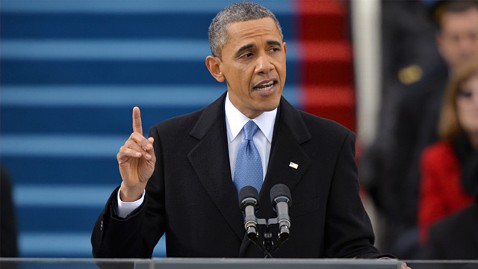President Obama on Monday became the first president to use the word “gay” as a reference to sexual orientation in an inaugural address, declaring the movement for equality to be part of the pantheon of America’s great civil rights struggles.
“Our journey is not complete until our gay brothers and sisters are treated like anyone else under the law,” the president said. “For if we are truly created equal, then surely the love we commit to one another must be equal, as well.”
Obama also made another reference in the speech to gay equality. He placed the 1969 riot protesting a police raid on a Greenwich Village gay bar, the Stonewall Inn, as a signature event in the civil rights movement — and ranked it with historical turning points in the battles for women’s and racial equality.
“We, the people, declare today that the most evident of truths — that all of us are created equal — is the star that guides us still, just as it guided our forebears through Seneca Falls and Selma and Stonewall,” Obama said.
Seneca Falls referred to an 1848 convention of female activists in an Upstate New York hamlet that produced one of the first declarations of the then-radical proposition that women should be equal to men.
The March 7, 1965 Selma, Ala., march was organized to advocate for African American voting rights and to protest the killing of a young black man by a state trooper. It would become known as Bloody Sunday for the violence that was inflicted on marchers by police at the Edmund Pettus Bridge, stirring national outrage.
By mentioning Stonewall with Seneca Falls and Selma, “it closely associates it with other freedom struggles that have great legitimacy,” said John D’Emilio, a University of Illinois at Chicago professor who has written extensively about Stonewall. “Think of it: Here is a group of people who in the president’s lifetime had been reviled.”
Gay rights advocates were jubilant.
Obama “made history today by connecting the lives of committed and loving lesbian and gay couples fighting for marriage equality to this nation’s proud tradition of equal rights for all,” said Chad Griffin, president of the Human Rights Campaign, a leading organization advocating on behalf of gay men, lesbians, bisexuals and transgender people.
In San Francisco, the epicenter of gay activism, Kate Kendell, executive director of the National Center for Lesbian Rights, was watching the inaugural address with a diverse group of about 70 friends.
“Everyone was moved and felt this very strong sense of the privilege of watching amazing history being made,” she said in an interview. “We all had this sense of the privilege it is to be witnesses to a liberation moment.”
Adding to the resonance of Obama’s words was the fact that his second inauguration occurred on the national holiday celebrating the birth of the slain civil rights leader Martin Luther King Jr. The president was sworn in using Bibles that had belonged to King and Abraham Lincoln.
The timing of his comments was also significant. In March, the Supreme Court will take up two major cases involving state and federal efforts to preserve the traditional definition of marriage as limited to heterosexual couples. The court was seated nearby as Obama delivered his address.
The moment also marked the continuation of a progression in Obama’s own views and the intensity of his advocacy of gay rights.
When he was elected in 2008, he was opposed to same-sex marriage. Two years later, he said his position on the issue was “constantly evolving.” And in May, he became the first U.S. president to embrace the concept that same-sex couples should be allowed to wed.
In 2011, he lifted the ban on gays serving openly in the military. His administration has also refused to defend the 1996 Defense of Marriage Act, a federal law that defines marriage solely as a union between a man and a woman.
Early in his administration, some gay rights advocates expressed frustration at what they saw as tepid support for their agenda. Columnist Andrew Sullivan observed acidly that the president had been seized by the “fierce urgency of whenever” — a jab mocking Obama’s frequent invocation of a favorite King quote that described the “fierce urgency of now.”
But after Obama’s turnaround on gay marriage last year, Sullivan wrote a Newsweek cover story that depicted the president with a rainbow-hued halo. It was headlined: “The First Gay President.”
Kendell said Obama has proved to be “an ally of the first order, and the sort of ally we have never had in the White House, and who we need if we are going to finish the job.”
“For any civil rights movement to succeed,” she added, “you need individuals who have access to power and who are willing to risk their power and their access and their political capital for you.”











